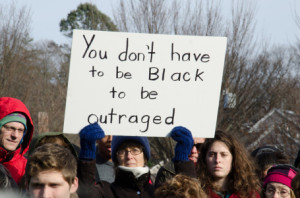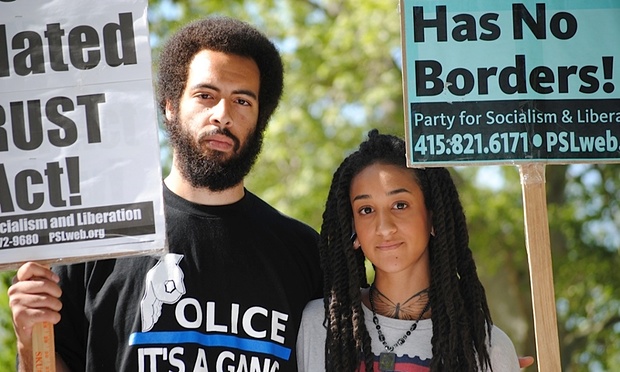This legislation can only be viewed as a rebuke of California’s police bullies.
 Until yesterday, the California penal code applied the term “lynching” to the crime of trying to seize someone from police custody. Now, the legislature and governor have removed that term from the California code to stop cops from trying to turn protesting police brutality into a felony by charging the protesters with “lynching” for disobeying police commands.
Until yesterday, the California penal code applied the term “lynching” to the crime of trying to seize someone from police custody. Now, the legislature and governor have removed that term from the California code to stop cops from trying to turn protesting police brutality into a felony by charging the protesters with “lynching” for disobeying police commands.
We all know what lynching is. It’s when a mob seizes a person and kills them. Sometimes the victim is forcibly removed from police custody, for example by a mob breaking into a jail to grab a person suspected of a crime that has inflamed the community.
Not a few people would argue that police across the country are regularly lynching black people under the color of law enforcement. So it was ironic, and provoked outrage, when Sacramento cops charged Maile Hampton, a 20-year-old protest leader at a “Black Lives Matter” rally, with “lynching” for tussling with a cop over a sign held by another protester who was in the process of being arrested.
That’s somewhat like charging a kid with terrorism for bringing a toy squirt gun to school. If the kid is black, and the school officials are white, you’d suspect racism is involved. Although with cops the racism isn’t always obvious, because they’re pricks with anyone trying to exercise First Amendment rights; for example, two caucasian activists arrested along with Hampton at the same rally also were charged with lynching. But there’s certainly evidence that some police bullies pick on blacks more than whites. For example, I recall a case where a black guy (mistakenly arrested on a warrant for someone else with the same name) was beaten up in jail by cops and then charged with “property destruction” because his blood splattered on their precious uniforms.
“California’s lynching law was put on the books in 1933, to prevent mobs from forcibly taking people from police custody for vigilante justice, the Guardian says. “But the statute has long been used against protesters as well, by police if not prosecutors. In 1999, anti-fur protesters in San Francisco who blocked access to a Neiman Marcus store in Union Square were charged under the lynching law. Prosecutors declined to take the case to court. In 2011, police in Oakland used it against members of the Occupy movement, arresting at least two activists, Tiffany Tran and Alex Brown, on the count during a sweep of a public plaza. The charges were dropped. In 2012, police in Los Angeles also used the lynching law against Occupy, when an activist named Sergio Ballesteros was accused of intervening in an arrest during an Art Walk – according to published reports, the charge was later dropped. Last year, in the conservative Southern California enclave of Murrieta, it was used on at least one activist, Janet Mathieson, who was arrested while protesting in support of migrant detainees. She is scheduled for sentencing on 10 April, in a plea bargain that involves dropping the felony charge and pleading guilty to a misdemeanor charge of obstructing or resisting, according to Riverside County district attorney spokesman John Hall.”
In other words, throughout California, cops have misused the lynching law to threaten protesters with felony convictions and long prison sentences for committing misdemeanor acts of resisting police authority, which is sort of the nature of protests and civil disobedience. Black activists protesting police brutality are prime targets for this bullying.
In most cases, prosecutors haven’t back up these cops. The district attorneys know better than to seek a four-year prison sentence for stepping off a curb into the street after being told by a cop to stay on the sidewalk. But these incidents tell us a lot about the police mentality toward the public they’re supposed to protect and serve, and who pay their salaries.
“It seemed very hypocritical and outrageous that … four uniformed white men came into my home, an African American woman, took me out of my home, put me in jail for standing up for black people – on lynching,” said Hampton. “Under the circumstances of that day, it was apparent to me it was an intimidation tactic.”
The mayor of Sacramento interceded with the legislature on her behalf, and as a result, California’s cops will no longer be able to use that bullying tactic. The lynching law is no more.
(Click here for source.)
 Photo: This woman was charged with “lynching” for grabbing a protest sign away from a cop.
Photo: This woman was charged with “lynching” for grabbing a protest sign away from a cop.